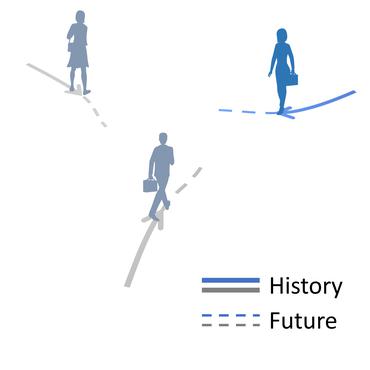Trajectory Forecasting
73 papers with code • 4 benchmarks • 16 datasets
Trajectory forecasting is a sequential prediction task, where a forecasting model predicts future trajectories of all moving agents (humans, vehicles, etc.) in a scene, based on their past trajectories and/or the scene context.
(Illustrative figure from Social NCE: Contrastive Learning of Socially-aware Motion Representations)
Datasets
Most implemented papers
Social GAN: Socially Acceptable Trajectories with Generative Adversarial Networks
Understanding human motion behavior is critical for autonomous moving platforms (like self-driving cars and social robots) if they are to navigate human-centric environments.
It Is Not the Journey but the Destination: Endpoint Conditioned Trajectory Prediction
In this work, we present Predicted Endpoint Conditioned Network (PECNet) for flexible human trajectory prediction.
Social NCE: Contrastive Learning of Socially-aware Motion Representations
Learning socially-aware motion representations is at the core of recent advances in multi-agent problems, such as human motion forecasting and robot navigation in crowds.
Shape and Time Distortion Loss for Training Deep Time Series Forecasting Models
We introduce a differentiable loss function suitable for training deep neural nets, and provide a custom back-prop implementation for speeding up optimization.
Argoverse: 3D Tracking and Forecasting with Rich Maps
In our baseline experiments, we illustrate how detailed map information such as lane direction, driveable area, and ground height improves the accuracy of 3D object tracking and motion forecasting.
Trajectron++: Dynamically-Feasible Trajectory Forecasting With Heterogeneous Data
Reasoning about human motion is an important prerequisite to safe and socially-aware robotic navigation.
Social-STGCNN: A Social Spatio-Temporal Graph Convolutional Neural Network for Human Trajectory Prediction
Better machine understanding of pedestrian behaviors enables faster progress in modeling interactions between agents such as autonomous vehicles and humans.
Peeking into the Future: Predicting Future Person Activities and Locations in Videos
To facilitate the training, the network is learned with an auxiliary task of predicting future location in which the activity will happen.
OpenTraj: Assessing Prediction Complexity in Human Trajectories Datasets
Human Trajectory Prediction (HTP) has gained much momentum in the last years and many solutions have been proposed to solve it.
Exploring Dynamic Context for Multi-path Trajectory Prediction
In our framework, first, the spatial context between agents is explored by using self-attention architectures.





 UCY
UCY
 highD Dataset
highD Dataset
 inD Dataset
inD Dataset
 JAAD
JAAD
 rounD Dataset
rounD Dataset
 TrajNet
TrajNet
 FPL
FPL
 PIE
PIE
 exiD Dataset
exiD Dataset
 TrajAir: A General Aviation Trajectory Dataset
TrajAir: A General Aviation Trajectory Dataset
